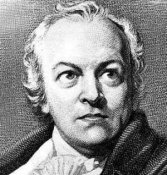William Blake
Source: http://212.84.179.117/i/William%20Blake.jpg
THE
CHIMNEY SWEEPER
A little black thing upon the snow:
Crying weep, weep. in notes of woe!
Where are thy father & mother? say?
They are both gone up to the church to pray.
Because I was happy upon the heath.
And smil'd among the winters snow:
They clothed me in the clothes of death.
And taught me to sing the notes of woe.
And because I am happy. & dance
& sing.
They think they have done me no injury:
And are gone to praise God & his Priest & King
Who make up a heaven of our misery.
(From Songs of Experience 1794)
Source: http://www.uv.es/~fores/poesia/poesoe.html#chimney
To
begin with, it is important to mention who the Chimney Sweeper is and what it represents.
First of all, a Chimney Sweeper is a person who cleans chimneys. Because of
that, this person is always dirty and black, so, the children are scared when
they see him in the streets and finally, a Chimney Sweeper is a person with
good luck and represents a cultural thing.
The
poet, William Blake, writes about a child, who maybe could be Blake when he was
young. Anyway, this child, who is dirty and black because he has cleaned some
chimneys, is outside, in the snow, crying and someone asked for his parents,
who have gone to church to pray to the God, the Priest and the King. All these
people make the people of the town poor and so the town live in real misery.
Despite
of this, the child declares that he is happy and he is dancing and signing, but
he sings the notes of a sad story.
This
poem is written in the first person when the “child in the poem” talks about
what he is doing and how he feels.
Moreover, we can find some references to the second person when the author
or the narrator of this poem asked “the child in the poem” for his parents. And
finally, it also used the third person in pronouns to refer not only to the
child’s parents but also to the God, the Priest and the King.
As
far as contrast concepts are concerned, we can remark the use of two
adjectives, “Black thing” vs. “White snow”. The author says that the Chimney
Sweeper is a “black thing”, because all his clothes and also his skin are dirty
and so, black. But, on the other hand, we find this child in the white snow.
Then, in this sense, “black” could mean unhappiness, hatred and anger, whereas,
“white” could mean purity and happiness. Furthermore, we can find an irony when
the author says “heaven of our misery”. Here, Blake is criticizing that the
Monarchy has done that people of the town live in absolute misery and they will
be poor all their lives. Lastly, this poem is written in a darker tone.
Personally,
I have enjoyed reading this poem and furthermore it has been a bit difficult to
analyse because it is the first time I have analysed an English poem and what’s
more it is the first time I read English poetry. In other words, “I am
discovering a new world”.
As
far as “The Chimney Sweeper” is concerned, it has been very useful because I
have learnt new concepts and also I have known something else about English
poetry and culture.
I
think that Blake, in this poem, tries to be a social critic, in fact, he
criticises the Church and the Monarchy because they haven’t done anything about
the social and economic injustices. They are becoming richer meanwhile the
people of the town are becoming poor. But, Blake also criticises that poor
people because they have accepted that way of living.
To
sum up, Blake writes a poem that can be happy, with laughter, but also, it
changed to a much darker tone. Blake shows us a child who is angry at his
parents, the Church and even God. This child has a miserable life and he hates
them for it. Blake said that the Chimney Sweeper is happy when he is in the
snow, because it is the only moment he has some freedom and could be a child
again. This child said that “his parents have clothed him in the clothes of
death” because his poor life would be working hard and never would have any
freedom.
|
Reading module 01: William Blake |
|
Academic year 2006 (May 2006)
© a.r.e.a./Dr.Vicente Forés López
© Ana Mª Pardillos Murillo
Universitat de València Press
mailto:aparmu@alumni.uv.es
